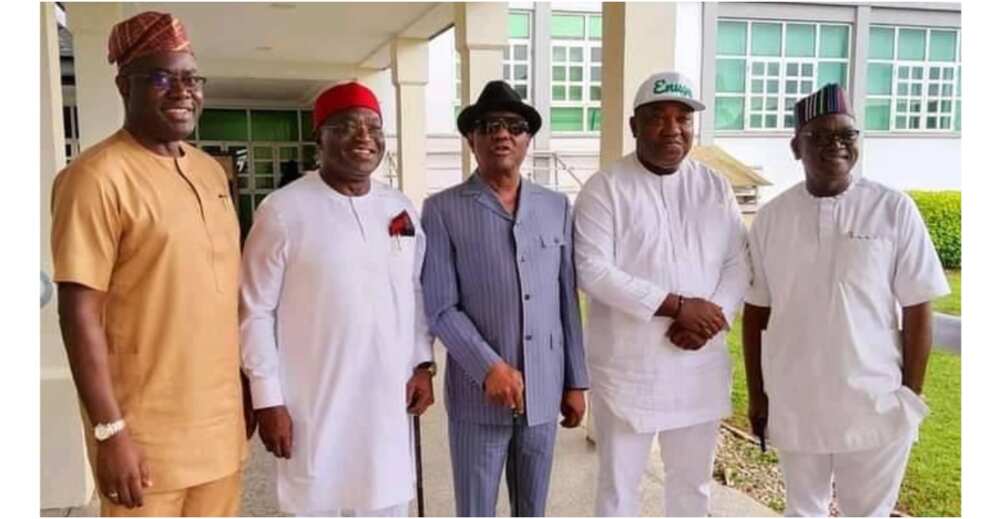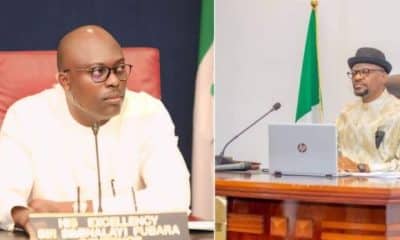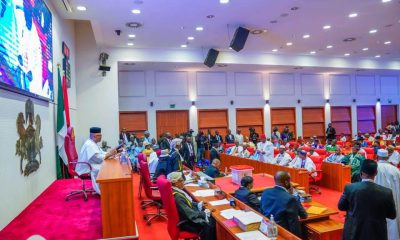Nigeria News
Defection Trend: 23 Sitting Governors Across 18 States Defect In 24 Years

In the period since Nigeria returned to democratic rule in 1999, a total of 23 incumbent governors from 18 states have switched political affiliations, departing from the parties under whose banners they were initially elected.
According to findings by LEADERSHIP, Sokoto, Imo, and Abia states have witnessed a higher frequency of defections by sitting governors over the past 24 years.
Within this timeframe, Sokoto has seen three of its incumbent governors defecting, while Abia and Imo state each experienced two such occurrences.
The investigation indicates that among these defections, 13 governors hail from the northern region, with the remaining 10 originating from the southern part of the country.
Notably, the administration of President Muhammadu Buhari witnessed the highest number of sitting governors abandoning their original political parties.
These defections unfolded within the context of 10 political parties, some of which have ceased to exist due to mergers or deregistrations. The involved parties include All Peoples Grand Alliance (APGA), Alliance for Democracy (AD), All Nigeria Peoples Party (ANPP), Progressives Peoples Alliance (PPA), All Progressives Congress (APC), Peoples Democratic Party (PDP), Democratic People’s Party (DPP), Action Congress (AC), Labour Party (LP), and Zenith Labour Party (ZLP).
Naija News gathered that the 1999 Constitution (as amended) outlined four avenues through which a serving governor can be removed from office: death, resignation, incapacitation, and impeachment, with defection not being one of them.
Between 2007 and 2015, seven defections occurred, while five governors defected between 1999 and 2007.
The North West zone witnessed the highest number of defections, with eight incumbent governors switching parties in Sokoto, Zamfara, Kano, Kebbi, and Jigawa states.
The South East ranks second, with five governors from Abia, Imo, and Ebonyi defecting while in office.
In the North East, three cases of defection were recorded in Bauchi and Adamawa states. The South-South states of Rivers, Cross River, and Edo experienced three defections since 1999.
Notably, Kaduna and Katsina are the only states in the Northwest where governors have remained in their original parties until the end of their tenures in the last 22 years.
In the overall tally, Sokoto State leads with the highest number of serving governors defecting to other parties. Over the period from 1999 to 2023, Attahiru Bafarawa, Aliyu Wamakko, and Aminu Tambuwal, all governors of Sokoto State, switched political affiliations.
Bafarawa transitioned from ANPP to DPP, while his successor, Wamakko, shifted from PDP to APC, and Tambuwal moved from APC to PDP.
Abia, Adamawa, Imo, and Zamfara state they each witnessed two instances of defections. In Abia, Orji Kalu switched from PDP to PPA, and his successor, Theodore Orji, moved from PPA to PDP.
In Adamawa, Boni Haruna transitioned from PDP to AC, while Murtala Nyako left PDP for APC. In Imo, Ikedi Ohakim defected from PPA to PDP, and Rochas Okorocha moved from APGA to APC. In Zamfara, Mahmuda Shinkafi shifted from ANPP to PDP, and Matawalle moved from PDP to APC.
Interestingly, Kwara State Governor Abdulfatah Ahmed defected twice while in office, first leaving PDP for APC in 2013, and later returning to PDP in July 2018.
In the North East, there were no defections in Borno, Yobe, Gombe, and Taraba states. No governor in Plateau, Nasarawa, Niger, and Kogi states defected in the North Central.
In the South West, there were no party switches by governors in Oyo, Ekiti, Ogun, and Osun states. Similarly, Bayelsa, Akwa Ibom, and Delta states did not witness any defections during the reviewed period. The same held true for the South East states of Anambra and Enugu.
Yesterday, distinguished legal professionals expressed disapproval of the prevalent trend of defections among political officeholders.
These lawyers contended that the practice of securing electoral victories on the platform of one party and subsequently defecting to another for self-serving political motives is morally questionable.
Senior Advocate of Nigeria, Abdul Balogun, asserted that politicians in the country have exploited the trust of the Nigerian people for an extended period, characterizing the situation as a disregard for ethical standards.
“Unfortunately, politicians will always find a way to escape the consequences of their actions“, he said.
He noted that the present 1999 Constitution specifically disapproves of lawmakers defecting only within the State House of Assembly and the National Assembly.
He said: “In specific terms, Section 68 (1) of the constitution states, ‘A member of the Senate or of the House of Representatives shall vacate his seat in the House of which he is a member, if being a person whose election to the House was sponsored by a political party, he becomes a member of another political party before the expiration of the period for which that House was elected‘.
“But what do we have today; lawmakers cross-carpet at will without consequences. Sometimes, some of these laws are just there without implementation. Again, sometimes, when some of these cases go to court, it is frustrating. We need a strong will to ensure these laws are carried out to the letter, which will serve as a lesson to politicians.”
Barrister Joel Amanda pointed out that the law does not address the defection of governors.
“At least from my knowledge of happenings in the country as regards defections, no governor has lost his seat for defecting from one political party to another.
“This is not good for the image of the country and our electoral processes. From 1999 till date, I’m not aware that any governor has been sacked or removed from office due to defection,” he said.
According to Lagos-based lawyer Barrister Saudi Hammed, defection signifies a departure from political ideals and values.
He emphasized that politicians are elected not solely based on individual merit and recognition but also on the influence and prominence of their political parties as crucial instruments in political contests.
“The world over, political parties in a democracy are distinguished and identified by their ideologies and guiding philosophies. Sadly, these are lacking in Nigeria in the current political dispensation. Instead, the major attraction to politics has been the huge perks and patronage in public office. When these are not forthcoming, defection becomes the next option,” he said.












